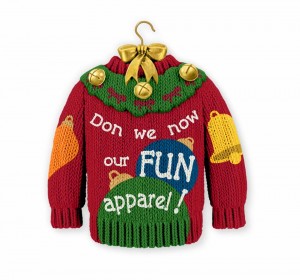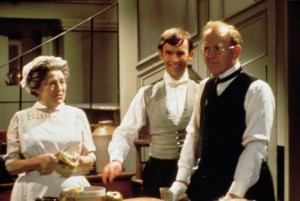Words and language in the news during Hallowe’en week, including Obama’s (allegedly) ungrammatical tweet, Hallmark rewriting verse for the sake of political correctness, Star Wars bloopers, and more …
~~~~~~~
No-one was madder than him about his Affordable Care Act web site’s glitches, Barack Obama tweeted. But the Twittersphere erupted. “Madder isn’t a word!” the Twitterati exclaimed. Well, in fact, it is: it’s the comparative of mad. As Kory Stamper wrote in The Guardian, you can’t win when you’re a president: we hold our leaders to an impossible standard, especially when it comes to their choice of words and language “registers” in certain contexts and situations. If they’re correct, they’re accused of snobbery; if they use slang or acceptable informal vernacular, they’re just wrong.
* * *
Is Hallmark taking political correctness to ridiculous extremes? Adorning its new ugly holiday sweater ornament (sic) is a line from the Christmas carol Deck the Halls — adulterated. “Don we now our fun apparel”. Huh? Can’t holiday sweaters be ugly AND gay? We’ve been singing about our gay apparel since 1866, and people doth protest about this surprising edit. According to the Associated Press, Hallmark issued a statement in its defense: “‘Hallmark created this year’s Holiday Sweater ornament in the spirit of fun. When the lyrics to “Deck the Halls” were translated from Gaelic and published in English back in the 1800s, the word “gay” meant festive or merry. Today it has multiple meanings, which we thought could leave our intent open to misinterpretation,’ the statement read. ‘The trend of wearing festively decorated Christmas sweaters to parties is all about fun, and this ornament is intended to play into that, so the planning team decided to say what we meant: “fun.” That’s the spirit we intended and the spirit in which we hope ornament buyers will take it.'” Hallmark updated its statement yesterday, adding: “In hindsight, we realize we shouldn’t have changed the lyrics on the ornament.”
* * *
In a piece about how infants learn languages, Time explores how language acquisition can vary wildly between children, depending on the nature of the native tongue being mastered. For example, one important factor is the relative balance between nouns and verbs in the language being learned.
* * *
And in another article about babies and language, Popular Science reveals how the language you hear growing up affects how you learn to count. “English-speaking toddlers learn the idea of the number one faster than Japanese- and Chinese-speaking kids, while Slovenian-speaking babies learn “two” sooner than English-speaking ones.”
* * *
A Star Wars blooper reel that surfaced on Reddit this week shows Harrison Ford — aka Luke Skywalker — asking for reassurance about how to pronounce the word “supernova”, according to Salon.com. See the video here.
* * *
As Oscar season approaches, we want to be able to join in all the erudite discussions about who’s going to win which award. But some of those names — of people both behind and in front of the camera — can be hard to pronounce. Have no fear: Slate’s culture blog shows us how …
* * *
Controversy continues to rage over the pronunciation of the acronym GIF. As Mediabistro reported, “Complex decided to ask Philip Corbett, the Times’ standards editor, if “jif” was the official Times way. He wouldn’t say. “I wasn’t involved in the discussions about today’s story and I think I want to steer well clear of the heated debate over the pronunciation of GIF,” Corbett told Complex. “I know a no-win situation when I see one.” Well, “The Oxford English Dictionary accepts both pronunciations,” the GIF’s inventor, Steve Wilhite, said in the New York Times back in May. But he was willing to stick his neck out. “They are wrong. It is a soft ‘G,’ pronounced ‘jif.’ End of story.”









